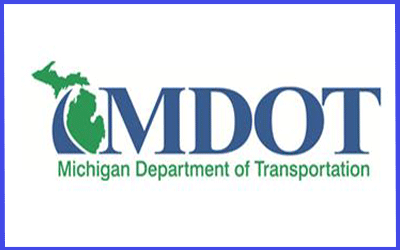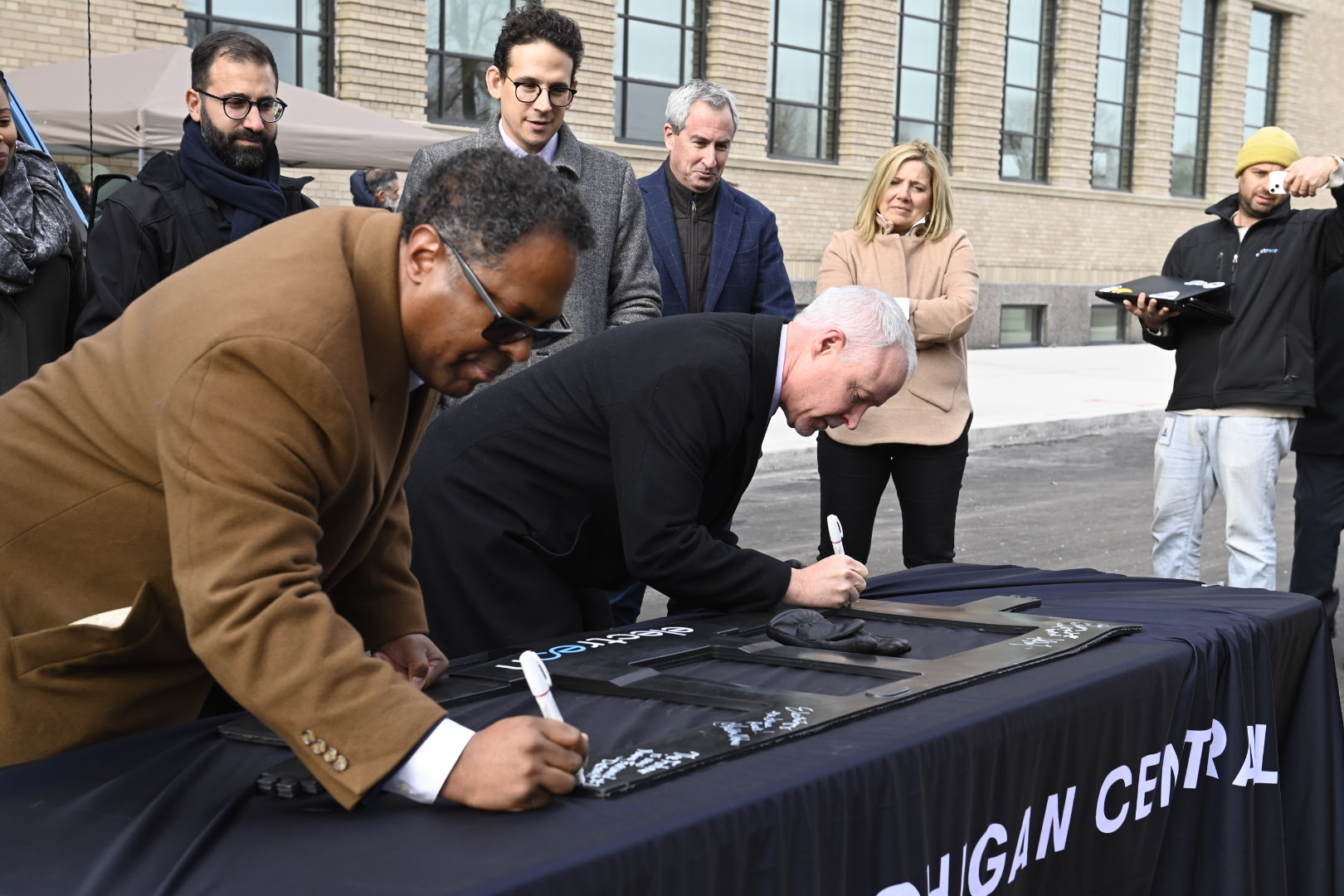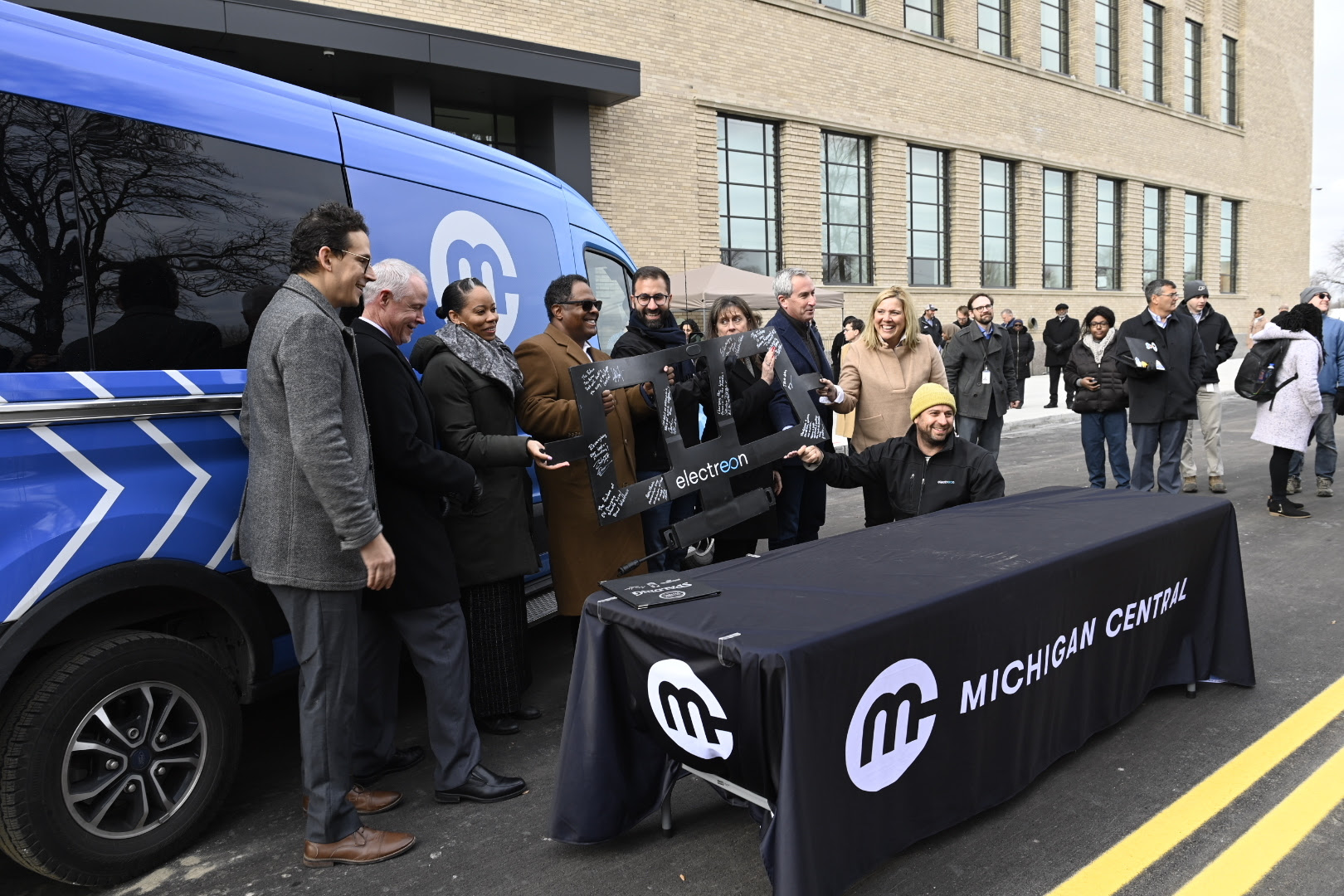
State asking citizens how to fund transportation
|

|


|
| FOR IMMEDIATE RELEASE January 30, 2024 |
MEDIA CONTACT Michael Frezell 517-281-6519 FrezellM@Michigan.gov |
MDOT launches road usage charges survey
to gauge public interest
Fast facts:
– MDOT is launching a road usage charges survey at www.Michigan.gov/MIRoadCharge.
– The survey will give the public the opportunity to weigh in on possible new ways to sustainably and fairly fund and maintain the state transportation system.
– Respondents will receive a $10 gift card for their participation.
LANSING, Mich. – Starting Jan. 30 through March 1, Michigan residents will have the opportunity to weigh in on the way we all pay for roads, bridges, and other transportation infrastructure in the state through a new road usage charges survey. Each respondent will receive a $10 gift card for their participation. To participate, go to www.Michigan.gov/MIRoadCharge.
The survey, being conducted by the Michigan Department of Transportation (MDOT) in partnership with Via Transportation, Inc. (Via) through funding provided through a federal grant, seeks to understand Michiganders’ attitudes toward potential replacements for the state gas tax. While no changes like this are being debated by the Legislature at this time, the statewide survey is the first step in exploring new ways to sustainably and fairly fund and maintain public transit systems, roads, bridges, and other crucial transportation infrastructure in Michigan.
One possible funding tool is road usage charges, which means drivers would pay a few cents for each mile driven versus paying based on how much gas they buy. Charging based on miles driven could make the system fairer for drivers who cannot afford newer, more fuel-efficient cars, while also ensuring that the state continues to have the resources needed to maintain roads in the future as vehicles become more fuel efficient or rely on alternative fuels.
Eligibility:
Respondents must be a Michigan resident aged 18 or older and can take the survey only once. Qualifying survey participants will be invited to participate in a pilot demonstration this fall to help us understand how road usage charges could work in Michigan. If interested, please let us know when completing the survey. By participating in the pilot demonstration, you could be eligible for additional incentives ranging from $75 to $500.
Participants should allow up to two weeks to receive a gift card. Gift cards will arrive by e-mail from rewards@tremendous.com with the subject “Michigan Department of Transportation sent you a gift card.” If a participant is having issues with the survey, please e-mail michiganroadcharge@gmail.com using the e-mail address that was provided when completing the survey.
Accessibility:
The survey is available in English, Spanish, Arabic, and Chinese. Participants who require mobility, visual, hearing, written, or other assistance for effective participation should contact Orlando Curry at 517-241-7462 or CurryO@Michigan.gov. Forms are located on the Title VI webpage. Requests will be evaluated and honored to the extent possible.
About Via Transportation:
Founded in 2012, Via pioneered the TransitTech category by using new technologies to develop public mobility systems. Via works to fundamentally improve the way the world moves, providing technology in 600 communities and more than 35 countries and counting. Via is supporting MDOT in both survey implementation and pilot technology deployment to explore road usage charging in the state of Michigan.


|
| FOR IMMEDIATE RELEASE January 25, 2024
|
MEDIA CONTACT Michael Frezell 517-281-6519 FrezellM@Michigan.gov |
MDOT supports Gov. Whitmer for authorizing the final
$700 million of the Rebuilding Michigan program
Fast facts:
LANSING, Mich. – Michigan Department of Transportation (MDOT) officials are pleased Gov. Gretchen Whitmer wants to continue the successful Rebuilding Michigan program with $700 million more in investments in some of our state’s busiest roads and bridges, which she announced during the 2024 State of the State Address.
“Since my first day in office, we’ve gotten to work moving dirt and pouring concrete to fix our damn roads and bridges, but there’s always more work to do until we get the job done right,” said Gov. Whitmer. “That’s why I’m adding another $700 million to road work this year through the Rebuilding Michigan program. To date, we’ve fixed 20,000 lane miles and 1,400 bridges, supporting over 45,000 jobs without raising taxes. This last phase includes key projects like I-94 near Detroit Metro Airport, I-696 from Southfield through Warren, and an important bridge in Erie Township. I’m proud of our progress, yet mindful of the work ahead to ensure Michigan’s infrastructure meets the needs of all its residents.”
“MDOT supports Gov. Whitmer’s promise to fix Michigan’s roads and bridges long-term through the Rebuilding Michigan program,” said State Transportation Director Bradley C. Wieferich. “MDOT stands ready to get the job done safely and efficiently. I appreciate the governor has shown the utmost confidence in our men and women at MDOT in asking for this increased investment to deliver these important projects.”
The program’s goal is to rebuild the state highways and bridges (I, M and US routes) that are critical to the state’s economy and carry the most traffic. The investment strategy is aimed at fixes that result in longer useful lives and improves the condition of the state’s infrastructure. While the $700 million is not slated to go toward any new projects or any specific projects at this time, it can be used to complete existing projects across the state.
Here is a sample list of Rebuilding Michigan program projects expected to resume or start this year:
Last year, MDOT made great strides in repairing Michigan’s infrastructure and bringing new innovations to the forefront as highlighted in this video. MDOT thanks Gov. Whitmer for her commitment to help pave the way for a safer, more connected Michigan.
More project information is available on the MDOT website. See the governor’s 2024 State of the State Address online and join the conversation on social media using the hashtag #MISOTS2024.

|
|
|

 |
| FOR IMMEDIATE RELEASE November 29, 2023
|
MEDIA CONTACTS MDOT: Jocelyn Garza 989-245-7117 GarzaJ10@Michigan.gov Michigan Central: Dan Austin |
Electreon: Katelyn Davis 734-620-4528 katelyn@katelyndavis.comCity of Detroit: John Roach 313-244-7857 roachj@detroitmi.gov |
DETROIT – Detroit Deputy Mayor Todd Bettison, Michigan Department of Transportation (MDOT) Director Brad Wieferich and other partners celebrated a major milestone in the future of mobility and electrification today at the Michigan Central innovation district in Detroit as crews have finished installing the nation’s first wireless-charging public roadway.
Using technology from Electreon, 14th Street is now equipped with inductive-charging coils between Marantette and Dalzelle streets that will charge electric vehicles (EVs) equipped with Electreon receivers as they drive on the road. The road will be used to test and perfect this wireless-charging technology in a real-world environment and perfect it ahead of making it available to the public in the next few years, helping to further establish Michigan and Detroit as leaders in innovation and technology.
“We’re excited to spearhead the development and deployment of America’s first wireless charging road,” said Dr. Stefan Tongur, Electreon vice president of business development. “This milestone stands as a testament to our collaborative efforts with the State of Michigan and MDOT, the City of Detroit, Michigan Central, Ford, Mcity, Jacobs, Next Energy, DTE, and others. Alongside Michigan’s automotive expertise, we’ll demonstrate how wireless charging unlocks widespread EV adoption, addressing limited range, grid limitations, and battery size and costs.
This project paves the way for a zero-emission mobility future, where EVs are the norm, not the exception.”
The move toward electrification is widely touted by Gov. Gretchen Whitmer, who announced the pilot initiative in September 2021 to develop the nation’s first wireless charging infrastructure on a public road in Michigan. MDOT and Electreon have entered a five-year commitment to develop the electric road system (ERS), piloting the technology on Michigan roads.
Electreon’s wireless charging technology is based on inductive coupling between copper coils installed below the road surface and receivers installed on electric vehicles. When a vehicle with a receiver nears the in-road charging segments, the road transfers electricity wirelessly through a magnetic field. This electricity is then transferred as energy to the vehicle’s battery. These charging segments can transfer wireless electricity to the receiver either when the vehicle is parked (static charging) or is driving (dynamic charging). The electric road is safe for drivers, pedestrians and wildlife. Each coil in the road is activated only when a vehicle with an approved receiver passes over the coil. This ensures that energy transfer is controlled and provided only to vehicles that require it.
“Michigan has always been at the forefront of innovation in mobility, and that forward-thinking is on display with the latest advances in inductive charging from Electreon, the first deployment of this electric vehicle charging technology in the United States,” said Chief Mobility Officer Justine Johnson of the Office of Future Mobility and Electrification. “This latest milestone supports the goals of the MI Future Mobility Plan to grow Michigan’s mobility leadership, and proves that companies like Electreon can test and deploy the newest innovations right here in Michigan.”
MDOT and Electreon, a Newlab at Michigan Central member company, agreed to install a combined mile of inductive-charging roadway in Detroit’s historic Corktown neighborhood. 14th Street, owned and maintained by the City of Detroit, now has a quarter-mile segment of wireless charging roadway. The charging road runs alongside the Newlab at Michigan Central Building, home to more than 60 tech and mobility startups, allowing for the further testing and advancement of this next-generation technology. In 2024, MDOT will begin seeking bids to rebuild part of US-12 (Michigan Avenue), which will see additional inductive charging installed. Electreon has also installed two static inductive charging stations in front of Michigan Central Station, which will be able to charge Electreon-equipped vehicles while they are parked.
“We are excited to partner with MDOT, the City of Detroit and Electreon to bring the future of roads to Michigan,” said Michigan Central CEO Joshua Sirefman. “This is what Michigan Central is all about, not only convening key partners across the public and private sectors to fuel innovation and create jobs and investment in Detroit, but also providing the environment to safely test and hone technology like Electreon in real time and in the real world. It is through this collaboration and advancement that Michigan Central is helping to tackle global problems and fast-track solutions to many of our greatest mobility challenges.”
As the auto capital of the world, Michigan stands ready to lead the nationwide charge toward electrification of our vehicles and roadways. Partnering with industry to develop and test these new technologies will help develop the blueprint necessary to introduce wireless charging roads nationwide.
“For more than a century, Detroit has been known around the world as the leader in transportation innovation,” said Detroit Mayor Mike Duggan. “We are the birthplace of the auto industry, and the home of the first mile of concrete road and the first three-way traffic signal. Today, thanks to Gov. Whitmer and our partners at Michigan Central and Electreon, we can add the nation’s first wireless charging public roadway to that list of innovations.”
Remaining work along 14th Street is expected to continue through the end of 2023, with extensive testing of the inductive charging technology beginning in early 2024. Using a Ford E-Transit electric commercial van provided by Ford Motor Co. and equipped with the Electreon receiver, staff will test the efficiency and operations of the vehicle and study potential long-term public transportation opportunities.
“Developing electrified roadways may be the catalyst to accelerate interest and acceptance of EVs for all consumers,” said MDOT Director Bradley C. Wieferich. “Making it easier for EV users to find a reliable charging source without disrupting their commute supports both fleet operations and passenger travel. We’re proud to collaborate with private industry partners and the City of Detroit to support these important initiatives leading us toward a more sustainable future with fewer emissions.”
About Electreon
Electreon is the leading developer and provider of wireless charging solutions for EVs, providing end-to-end charging infrastructure and services to meet the needs and efficiency demands of shared, public, and commercial fleet operators. The company’s proprietary inductive technology charges EVs quickly and safely both while driving and parked, eliminating range anxiety, lowering total costs of EV ownership, and reducing battery capacity needs, making it one of the most environmentally sustainable, scalable, and compelling charging solutions available in the market today. Electreon collaborates with cities and fleet operators on a “sale” business model, and on a Charging as a Service (CaaS) business model, that enables cost-effective electrification of public, commercial, and autonomous fleets for smooth and continuous operation. Electreon operates 18 projects across eight countries, together with more than 100 partners. Electreon’s wireless in-road charging technology was named one of the world’s top 100 inventions for 2021 by Time Magazine. For more information, visit electreon.com.
About Michigan Central
Michigan Central is a center for advancing technologies and programs that address barriers to social, economic and physical mobility. The campus is both a convening place and a call-to-action to advance a more sustainable, equitable future through a community-based approach to mobility solutions. Building on Detroit’s rich history as an engine of change, the transformative Michigan Central project aims to strengthen the city’s existing fabric of community and accelerate its economy, while inspiring collective action on the most pressing challenges at the intersection of mobility and society worldwide.

Photo caption: MDOT Director Bradley C. Wieferich and Detroit Deputy Mayor Todd Bettison sign an Electreon coil, marking the start of the nation’s first electrified public road.

Photo caption: MDOT and partners celebrate the first-in-the-nation electrified public roadway on 14th Street in Detroit.

|
|